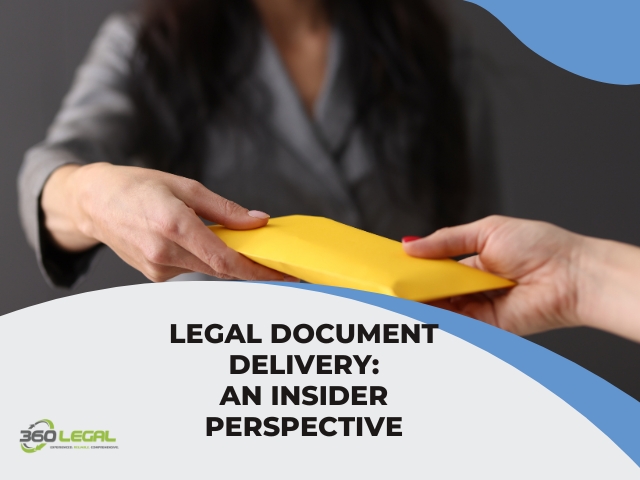Testing RSS Feeds.. ignore post.
Testing RSS Feeds.. ignore post.
Legal Document Delivery: An Insider Perspective

The realm of law is a complex orchestra of numerous players and processes. Legal document delivery is one of this legal symphony’s most critical, albeit often understated, components. This article examines legal document delivery’s intricacies, challenges, and evolving dynamics.
The Essence of Legal Document Delivery
Legal document delivery, often synonymously used with process serving, lies at the heart of the legal system. It involves serving legal papers like summonses, complaints, subpoenas, or writs to involved parties in a lawsuit. This procedure safeguards an individual’s right to due process, enshrined in the 5th and 14th Amendments of the U.S. Constitution.
The Criticality of Legal Document Delivery
Legal document delivery is the first vital step in any legal proceeding. Its fundamental role is to ensure that every party involved in the lawsuit is aware of it and gets an opportunity to present their side. This delivery provides transparency, fosters trust, and upholds the principles of justice. Any glitch in this step can lead to unnecessary delays, dismissal of the case, or an unfair trial. Hence, the weight of this responsibility makes the process and those executing it crucial to the wheels of justice.
The Players in Legal Document Delivery
The agents of legal document delivery, commonly known as process servers, are often individuals or law enforcement officers assigned to deliver the legal documents to the concerned party. In some cases, anyone over 18, not a party to the case, can serve the papers. However, the choice of a process server can significantly influence the efficiency and success of the service, owing to the challenges that often accompany this process.
The Intricacies and Challenges
Despite the apparent simplicity of its role—delivering documents—legal document delivery is replete with challenges. Locating and serving elusive defendants can be daunting, often requiring sleuth-like detective skills. Some defendants may change addresses, use aliases, or employ other tactics to evade service. Process servers might encounter hostility, threats, or even physical harm in more contentious cases, making the job risky.
Another hurdle is the maze of regulations that govern the process. Rules for serving papers can vary from state to state and even between jurisdictions within the same state. A minor deviation can render the service void, leading to legal complications, case dismissal, or the necessity of reserving the papers.
The impact of COVID-19 added another layer of complexity. The pandemic-related social distancing measures and the switch to remote working posed unique challenges to personal service, which typically involves close physical interaction.
The Role of Technology in Legal Document Delivery
Technology has brought about a paradigm shift in legal document delivery. GPS tracking, public record databases, and online resources are instrumental in tracking down defendants. Video recording offers incontrovertible proof of service, minimizing disputes about whether the service took place.
The digital revolution has also given birth to the electronic service of process (eService). Some jurisdictions now recognize eService as a valid service, which is beneficial when dealing with hard-to-locate or evasive defendants. However, this method presents challenges, such as confirming the receipt of documents and identity verification. Despite these obstacles, eService can make legal document delivery quicker and more efficient.
The Future of Legal Document Delivery
Looking ahead, it is evident that legal document delivery will continue to evolve in tandem with societal shifts and technological advancements. Artificial Intelligence (AI) and Machine Learning (ML) offer exciting possibilities for predictive analytics and automating administrative tasks. Blockchain technology holds promise for secure, verifiable, and tamper-proof electronic service of process.
Even as technology brings potential solutions to many challenges, it also introduces new dilemmas. Electronic privacy issues, the digital divide, and the need for legal systems to catch up with technological changes are hurdles that will need addressing.
Insider Perspective
From an insider’s perspective, legal document delivery is much more than just a handoff of papers. It’s a high-stakes endeavor requiring tenacity, problem-solving skills, and a keen understanding of legal processes. Successful process servers are resourceful, adaptable, and prepared for the unexpected. They understand the gravity of their role and are committed to upholding the integrity of the legal process.
While technology has been a game-changer, it cannot replace the human element that is often essential in completing a service. There is no digital substitute for the rapport, persuasion, and instinct experienced process servers bring to the job. However, the ability to blend traditional skills with new technologies will define the successful process server of the future.
Conclusion
In conclusion, legal document delivery forms a vital cog in the machinery of justice. Its role in safeguarding the right to due process is indispensable. The task comes with its share of challenges, continually evolving in response to societal and technological shifts. As we stand on the cusp of exciting technological advancements, the face of legal document delivery is set to change. Yet, the core principles of transparency, fairness, and justice underpin it remain unchanged. This balance between tradition and innovation will shape the future of legal document delivery.
Author
We are Social!
Latest tweets
Popular Tags
Testimonials
"5 star service ! prompt serving, helpful, professional . "
"Mike is awesome. Our firm has hired him on several occasions and we are very happy with his work. His prompt serving, helpful, professional and always in communication. I recommend him highly! "
"360Legal provides speedy and easy to use Process Service that is flexible, and very transparent with nearly instant reporting. It is very helpful for us to be able to track the status of our process service jobs, especially when they are time sensitive. "
Latest News
-

RMAI 2021 Annual Conference RMAI Annual Conference
April 12-15, 2021 -

NATIONAL CREDITORS BAR ASSOCIATION 2020 SPRING CONFERENCE
May 19-21, 2021 -

ALFN ANSWERS 2021
Jul 18-21, 2021 -

Annual Convention and Expo
Oct. 17-21, 2021 -

Florida Association of Professional Process Servers 33rd Quarter Board Meeting/Professional Beach Getaway
Aug. 20-22, 2021












